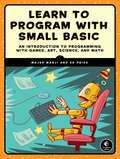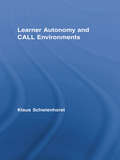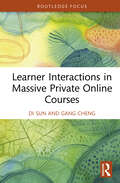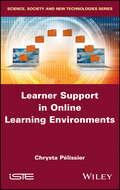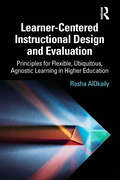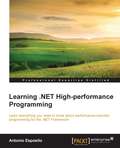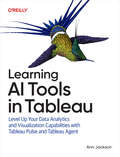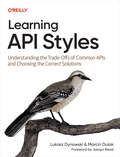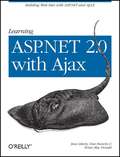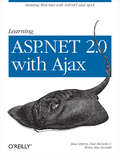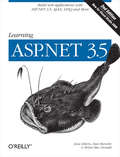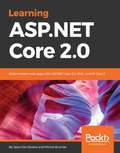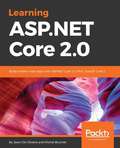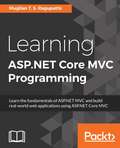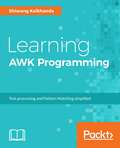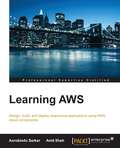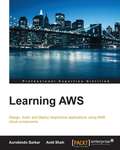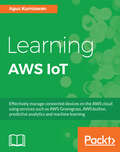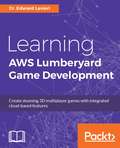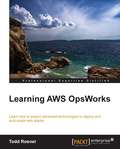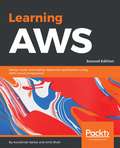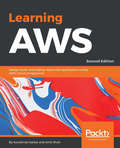- Table View
- List View
Learn to Program with Scratch: A Visual Introduction to Programming with Games, Art, Science, and Math
by Majed Marji<P>Scratch is a fun, free, beginner-friendly programming environment where you connect blocks of code to build programs. While most famously used to introduce kids to programming, Scratch can make computer science approachable for people of any age. Rather than type countless lines of code in a cryptic programming language, why not use colorful command blocks and cartoon sprites to create powerful scripts? <P>In Learn to Program with Scratch, author Majed Marji uses Scratch to explain the concepts essential to solving real-world programming problems. The labeled, color-coded blocks plainly show each logical step in a given script, and with a single click, you can even test any part of your script to check your logic. You'll learn how to: <br>–Harness the power of repeat loops and recursion <br>–Use if/else statements and logical operators to make decisions–Store data in variables and lists to use later in your program <br>–Read, store, and manipulate user input <br>–Implement key computer science algorithms like a linear search and bubble sort <br>Hands-on projects will challenge you to create an Ohm's law simulator, draw intricate patterns, program sprites to mimic line-following robots, create arcade-style games, and more! Each chapter is packed with detailed explanations, annotated illustrations, guided examples, lots of color, and plenty of exercises to help the lessons stick. Learn to Program with Scratch is the perfect place to start your computer science journey, painlessly.Uses Scratch 2
Learn to Program with Small Basic: An Introduction to Programming with Games, Art, Science, and Math
by Majed Marji Ed PriceSmall Basic is a free, beginner-friendly programming language created by Microsoft. Inspired by BASIC, which introduced programming to millions of first-time PC owners in the 1970s and 1980s, Small Basic is a modern language that makes coding simple and fun.Learn to Program with Small Basic introduces you to the empowering world of programming. You’ll master the basics with simple activities like displaying messages and drawing colorful pictures, and then work your way up to programming games! Learn how to:–Program your computer to greet you by name–Make a game of rock-paper-scissors using If/Else statements–Create an interactive treasure map using arrays–Draw intricate geometric patterns with just a few lines of code–Simplify complex programs by breaking them into bite-sized subroutinesYou’ll also learn to command a turtle to draw shapes, create magical moving text, solve math problems quickly, help a knight slay a dragon, and more!Each chapter ends with creative coding challenges so you can take your skills to the next level. Learn to Program with Small Basic is the perfect place to start your computer science journey.
Learner Autonomy and CALL Environments (Routledge Studies in Computer Assisted Language Learning #Vol. 3)
by Klaus SchwienhorstThis volume brings together two prominent strands in second language acquisition theory and research: the concept of learner autonomy and computer-assisted language learning (CALL). Learner autonomy supports learners in becoming more reflective and communicative and in experimenting with language and language learning. CALL environments offer more and qualitatively different opportunities for learner autonomy than the traditional language classroom. This book offers researchers a starting point into researching learner autonomy in CALL contexts and offers teachers practical advice on chances and pitfalls in realizing learner autonomy goals in the CALL-supported classroom.
Learner Interactions in Massive Private Online Courses
by Gang Cheng Di SunBy employing learning analytics methodology and big data in Learning Management Systems (LMSs), this volume conducts data-driven research to identify and compare learner interaction patterns in Massive Private Online Courses (MPOCs). The uncertainties about the temporal and sequential patterns of online interaction, and the lack of specific knowledge and methods to investigate details of LMSs' dynamic interaction traces have affected the improvement of online learning effectiveness. While most research focuses on Massive Open Online Courses (MOOCs), little is investigating the learners’ interaction behaviors in MPOCs. This book attempts to fill in the gaps by including research in the past decades, big data in education presenting micro-level interaction traces, analytics-based learner interaction in massive private open courses, and a case study. Aiming to bring greater efficiency and deeper engagement to individual learners, instructors, and administrators, the title provides a reference to those who need to evaluate their learning and teaching strategies in online learning. It will be particularly useful to students and researchers in the field of Education.
Learner-Centered Instructional Design and Evaluation: Principles for Flexible, Ubiquitous, Agnostic Learning in Higher Education
by Rasha AlOkailyLearner-Centered Instructional Design and Evaluation offers a forward-thinking, evidence-based vision of technology-enhanced higher education that taps into today’s digital access opportunities for more dynamic, agnostic, and inclusive learning experiences. The recent ubiquity of digital devices has fostered a new generation of learners who are technologically adept, engage in rapid social co-construction of knowledge, and expect increased choice and personalisation of educational content and environment. Colleges and universities, however, continue to apply their technology tools into outdated, passive pedagogies. Based on theory and empirical research, this book’s innovative framework guides scholars and practitioners toward instructional design and evaluation approaches that leverage the anytime-anywhere potential of wireless networked devices to foster flexible learning experiences and device-neutral assignments. Each chapter is rich with designs, deliveries, and evaluations of lesson plans, projects, and other real-world course works exemplifying the procedures and principles that will rejuvenate learning amid the globalisation, commodification, and massification of higher education.
Learner-Centered Theory and Practice in Distance Education: Cases From Higher Education
by Thomas M. Duffy Jamie R. KirkleyLearner-Centered Theory and Practice in Distance Education: Cases From Higher Education brings the voice of the learning sciences to the study and design of distance learning. The contributors examine critical issues in the design of theoretically and pedagogically based distance education programs. Eight distance education programs are described in enough detail to allow readers with different interests to understand the pedagogical approaches and the implications of implementing those approaches. Issues of theory, pedagogy, design, assessment, communities of practice, collaboration, and faculty development are discussed.Each section of the book includes: *a primary chapter written by an author or authors involved with a distance education program that reflects learner-centered principles;*a formal reaction to the chapter by a specialist from the learning sciences, educational evaluation and policy, administration, or the corporate sector with expertise in issues of distance learning; and *an edited transcript of the authors' discussion of the primary chapter held at a symposium at the Asilomar Conference Center. A final "summing up" section offers two perspectives--from leading scholars outside the fields of instructional design, evaluation, and the learning sciences--on the approaches and thinking reflected in the rest of the book. This book is essential for researchers, as well as all those engaged in delivering, supporting, or administrating distance education programs at the post-secondary level. The descriptions, strategies, and principles will inform the design of continuing education, as well as degree-based education and corporate education and training, and distance education programs for adults.
Learning .NET High-performance Programming
by Antonio EspositoIf you are a .NET developer with an understanding of application development, but want to learn how to optimize the performance of your applications, this is the book for you. Basic knowledge of C# is expected.
Learning AI Tools in Tableau: Level Up Your Data Analytics and Visualization Capabilities with Tableau Pulse and Tableau Agent
by Ann JacksonAs businesses increasingly rely on data to drive decisions, the role of advanced analytics and AI in enhancing data interpretation is becoming crucial. For professionals tasked with optimizing data analytics platforms like Tableau, staying ahead of the curve with the latest tools isn't just beneficial—it's essential.This insightful guide takes you through the integration of Tableau Pulse and Einstein Copilot, explaining their roles within the broader Tableau and Salesforce ecosystems. Author Ann Jackson, an esteemed analytics professional with a deep expertise in Tableau, offers a step-by-step exploration of these tools, backed by real-world use cases that demonstrate their impact across various industries. By the end of this book, you will:Understand the functionalities of Tableau Pulse and Einstein Copilot and how to use themLearn to deploy Tableau Pulse effectively, ensuring it aligns with your business objectivesNavigate discussions on AI's role within Tableau, enhancing your strategic conversationsVisualize how Tableau Pulse operates through detailed images and scenariosUtilize Einstein Copilot in Tableau Desktop/Prep to streamline and enhance data analysis
Learning API Styles: Understanding the Trade-Offs of Common APIs and Choosing the Correct Solutions
by Lukasz Dynowski Marcin DulakAn application programming interface (API) enables data exchange in systems such as web applications, microservices, and IoT devices. In this hands-on book, authors Lukasz Dynowski and Marcin Dulak show software developers and architects how to design and implement REST, GraphQL, gRPC, webhooks, WebSocket, messaging APIs, and more. This book looks at the most popular API styles from a network, application, and architecture perspective. You'll learn how to determine the appropriate type of API for your application use case and how to tackle design decisions along the way. You'll also learn the trade-offs between various APIs and acquire practical knowledge of how to implement them. Explore the origins and evolution of API styles Learn network protocols that various APIs use Understand the trade-offs of each API style Select an appropriate API style Learn how to implement, secure, and document the APIs
Learning ASP.NET 2.0 with AJAX
by Jesse Liberty Dan Hurwitz Brian MacdonaldWith this book, web developers can build engaging and interactive sites and applications using Microsoft's latest web development tools -- ASP.NET 2.0 and the new ASP.NET AJAX framework. You learn to create applications that have all the great tricks you see on popular commercial web sites, such as order forms and the ability to interact with a database. And you can build pages that display information interactively without a page refresh. This straightforward tutorial explains how. Learning ASP.NET 2.0 with AJAX helps you master the concepts and techniques of Microsoft's tools with plenty of annotated examples, review quizzes, web construction exercises and chapter summaries, so you can practice new skills and test your understanding as you go. With it, you'll learn to: Master the fundamental skills of ASP.NET 2.0 to build professional quality web applications Integrate new Ajax tools and CSS with ASP.NET 2.0 for flashier and more interactive sites Build applications with minimal coding using Visual Studio or its free counterpart, Visual Web Developer Connect your site with a database so that users can retrieve, interact and save data Debug your application, deal with unexpected problems, and protect your site from malicious users Use the community-maintained ASP.NET AJAX Control Toolkit to extend the controls that come with ASP.NET AJAX Use personalization tools to give your site a customized look for each user Ideal for beginning web developers, or those who are new to ASP.NET, this book gets you involved with your own learning through hands-on lessons that are clear and to the point. You get the chance to try out new techniques on the spot. Want to join the world of modern web development? This book will get you started.
Learning ASP.NET 2.0 with AJAX
by Jesse Liberty Dan Hurwitz Brian MacdonaldWith this book, web developers can build engaging and interactive sites and applications using Microsoft's latest web development tools -- ASP.NET 2.0 and the new ASP.NET AJAX framework. You learn to create applications that have all the great tricks you see on popular commercial web sites, such as order forms and the ability to interact with a database. And you can build pages that display information interactively without a page refresh. This straightforward tutorial explains how.Learning ASP.NET 2.0 with AJAX helps you master the concepts and techniques of Microsoft's tools with plenty of annotated examples, review quizzes, web construction exercises and chapter summaries, so you can practice new skills and test your understanding as you go. With it, you'll learn to: Master the fundamental skills of ASP.NET 2.0 to build professional quality web applicationsIntegrate new Ajax tools and CSS with ASP.NET 2.0 for flashier and more interactive sitesBuild applications with minimal coding using Visual Studio or its free counterpart, Visual Web DeveloperConnect your site with a database so that users can retrieve, interact and save dataDebug your application, deal with unexpected problems, and protect your site from malicious usersUse the community-maintained ASP.NET AJAX Control Toolkit to extend the controls that come with ASP.NET AJAXUse personalization tools to give your site a customized look for each user Ideal for beginning web developers, or those who are new to ASP.NET, this book gets you involved with your own learning through hands-on lessons that are clear and to the point. You get the chance to try out new techniques on the spot. Want to join the world of modern web development? This book will get you started.
Learning ASP.NET 3.5, 2nd Edition
by Jesse Liberty Dan Hurwitz Brian MacdonaldWith this book, you will learn how to create engaging and interactive web applications using the latest version of the world's most popular web development platform: ASP.NET with AJAX, built on the productivity-enhancing features of Visual Studio 2008. All you need to get started is a basic knowledge of HTML and a desire to produce professional quality websites. Learning ASP.NET 3.5 introduces new skills in each new chapter and offers fully annotated and fully functional examples that you can put to work immediately. Each chapter adds detailed summaries, practice questions to ensure comprehension, and exercises so you can apply what you've learned to new situations. Written by the bestselling author team of Jesse Liberty, Dan Hurwitz, and Brian MacDonald, Learning ASP.NET 3.5 offers complete, up-to-date coverage of ASP.NET 3.5 and AJAX. The book includes: * Chapters that are designed as a series of tutorials on different aspects of web development, * Examples in each chapter that illustrate how a new concept works. Different chapters feature either a single running example with several stages, or a series of smaller examples, * A single large example in the final chapter offers that uses everything the reader has learned, * VB, JavaScript, and SQL Cheat Sheet sidebars to help readers with no little or no background with those topics, * AJAX-style fully integrated into ASP.NET programming -- the way it should be taught and used. If you want to get up to speed with the world's most popular web development technology, Learning ASP.NET 3.5 is the best resource for the job.
Learning ASP.NET 3.5: Build Web Applications with ASP.NET 3.5, AJAX, LINQ, and More
by Jesse Liberty Dan Hurwitz Brian MacdonaldWith this book, you will learn how to create engaging and interactive web applications using the latest version of the world's most popular web development platform: ASP.NET with AJAX, built on the productivity-enhancing features of Visual Studio 2008. All you need to get started is a basic knowledge of HTML and a desire to produce professional quality websites.Learning ASP.NET 3.5 introduces new skills in each new chapter and offers fully annotated and fully functional examples that you can put to work immediately. Each chapter adds detailed summaries, practice questions to ensure comprehension, and exercises so you can apply what you've learned to new situations. Written by the bestselling author team of Jesse Liberty, Dan Hurwitz, and Brian MacDonald, Learning ASP.NET 3.5 offers complete, up-to-date coverage of ASP.NET 3.5 and AJAX. The book includes:Chapters that are designed as a series of tutorials on different aspects of web development Examples in each chapter that illustrate how a new concept works. Different chapters feature either a single running example with several stages, or a series of smaller examples A single large example in the final chapter offers that uses everything the reader has learned VB, JavaScript, and SQL Cheat Sheet sidebars to help readers with no little or no background with those topics AJAX-style fully integrated into ASP.NET programming -- the way it should be taught and used If you want to get up to speed with the world's most popular web development technology, Learning ASP.NET 3.5 is the best resource for the job.
Learning ASP.NET Core 2.0
by Jason De Oliveira Michel BruchetLearn how web applications can be built efficiently using ASP.NET Core 2.0 and related frameworks About This Book • Get to grips with the new features and APIs introduced in ASP.NET Core 2.0 • Leverage the MVC framework and Entity Framework Core 2 to build efficient applications • Learn to deploy your web applications in new environments such as the cloud and Docker Who This Book Is For This book is for developers who would like to build modern web applications with ASP.NET Core 2.0. No prior knowledge of ASP.NET or .NET Core is required. However, basic programming knowledge is assumed. Additionally, previous Visual Studio experience will be helpful but is not required, since detailed instructions will guide through the samples of the book.This book can also help people, who work in infrastructure engineering and operations, to monitor and diagnose problems during the runtime of ASP.NET Core 2.0 web applications. What You Will Learn • Set up your development environment using Visual Studio 2017 and Visual Studio Code • Create a fully automated continuous delivery pipeline using Visual Studio Team Services • Get to know the basic and advanced concepts of ASP.NET Core 2.0 with detailed examples • Build an MVC web application and use Entity Framework Core 2 to access data • Add Web APIs to your web applications using RPC, REST, and HATEOAS • Authenticate and authorize users with built-in ASP.NET Core 2.0 features • Use Azure, Amazon Web Services, and Docker to deploy and monitor your applications In Detail The ability to develop web applications that are highly efficient but also easy to maintain has become imperative to many businesses. ASP.NET Core 2.0 is an open source framework from Microsoft, which makes it easy to build cross-platform web applications that are modern and dynamic. This book will take you through all of the essential concepts in ASP.NET Core 2.0, so you can learn how to build powerful web applications. The book starts with a brief introduction to the ASP.NET Core framework and the improvements made in the latest release, ASP.NET Core 2.0. You will then build, test, and debug your first web application very quickly. Once you understand the basic structure of ASP.NET Core 2.0 web applications, you'll dive deeper into more complex concepts and scenarios. Moving on, we'll explain how to take advantage of widely used frameworks such as Model View Controller and Entity Framework Core 2 and you'll learn how to secure your applications. Finally, we'll show you how to deploy and monitor your applications using Azure, AWS, and Docker. After reading the book, you'll be able to develop efficient and robust web applications in ASP.NET Core 2.0 that have high levels of customer satisfaction and adoption. Style and approach Start an exciting journey to building high performance web applications using ASP.NET Core 2.0 and MVC
Learning ASP.NET Core 2.0
by Jason De OliveiraBeing able to develop web applications that are highly efficient while easy to maintain has become imperative in many businesses. ASP.NET Core 2.0 is an open source framework from Microsoft, which makes it easy to build cross-platform web applications that are modern and dynamic. This book will take you through all of the essential concepts in ASP.NET Core 2.0, so you can learn how to build powerful web applications.
Learning ASP.NET MVC Programming
by Mugilan T. RagupathiThis book is for developers who want to learn to build web applications using ASP.Net MVC 6, developers who want to make a career building web applications using Microsoft technology, and developers who are working in Ruby on Rails or other web frameworks and want to learn ASP.Net MVC6. No knowledge of the ASP.Net platform or the .Net platform is required. Even though you do not need to have experience in C#, an understanding of the basic constructs (loops, conditionals, classes, and objects) of any modern programming language would be helpful.
Learning AWK Programming: A fast, and simple cutting-edge utility for text-processing on the Unix-like environment
by Shiwang KalkhandaText processing and pattern matching simplifiedKey Features-Master the fastest and most elegant big data munging language-Implement text processing and pattern matching using the advanced features of AWK and GAWK-Implement debugging and inter-process communication using GAWKBook DescriptionAWK is one of the most primitive and powerful utilities which exists in all Unix and Unix-like distributions. It is used as a command-line utility when performing a basic text-processing operation, and as programming language when dealing with complex text-processing and mining tasks. With this book, you will have the required expertise to practice advanced AWK programming in real-life examples. The book starts off with an introduction to AWK essentials. You will then be introduced to regular expressions, AWK variables and constants, arrays and AWK functions and more. The book then delves deeper into more complex tasks, such as printing formatted output in AWK, control flow statements, GNU's implementation of AWK covering the advanced features of GNU AWK, such as network communication, debugging, and inter-process communication in the GAWK programming language which is not easily possible with AWK. By the end of this book, the reader will have worked on the practical implementation of text processing and pattern matching using AWK to perform routine tasks.What you will learn-Create and use different expressions and control flow statements in AWK-Use Regular Expressions with AWK for effective text-processing -Use built-in and user-defined variables to write AWK programs-Use redirections in AWK programs and create structured reports-Handle non-decimal input, 2-way inter-process communication with Gawk-Create small scripts to reformat data to match patterns and process textsWho this book is forThis book is for developers or analysts who are inclined to learn how to do text processing and data extraction in a Unix-like environment. Basic understanding of Linux operating system and shell scripting will help you to get the most out of the book.
Learning AWS
by Aurobindo Sarkar Amit ShahThis book is targeted at expert programmers and architects wanting to learn AWS. Some familiarity with Spring, MySQL, and RESTful web services is assumed.
Learning AWS
by Aurobindo Sarkar Amit Shah<P><P>Design, build, and deploy responsive applications using AWS cloud components <P><P>About This Book <P><P>Build scalable and highly available real-time applications <P><P>Make cost-effective architectural decisions by implementing your product's functional and non-functional requirements <P><P>Develop your skills with hands-on exercises using a three-tiered service oriented application as an example <P><P>Who This Book Is For <P><P>This book is targeted at expert programmers and architects wanting to learn AWS. Some familiarity with Spring, MySQL, and RESTful web services is assumed. <P><P>What You Will Learn <P><P>Multi-tenant design approaches for SaaS applications <P><P>Planning dev, test, staging, and production environments <P><P>Design considerations for scalability and high-availability <P><P>Planning for DR <P><P>The security considerations and implementation of AWS applications <P><P>Production deployment processes and tools <P><P>Monitoring AWS applications using CloudWatch <P><P>Automating infrastructure using CloudFormation <P><P>In Detail <P><P>With the increasing global interest in leveraging cloud infrastructure, AWS Cloud from Amazon offers a cutting-edge platform for architecting, building, and deploying web-scale cloud applications. The variety of features available within AWS can reduce overall infrastructure costs and accelerate the development process for both large enterprises and startups alike. <P><P>Beginning with basic cloud concepts, you'll learn about the various cloud services models and the design implications of multi-tenant applications. You'll then design, implement, and deploy a multi-tier, scalable, highly-available and secure application on the AWS platform. At every step, we explain the key guiding principles driving real-world production-ready application architectures. Finally, you will learn how to automate your cloud infrastructure, set up operations, application monitoring, and DevOps pipeline.
Learning AWS IoT: Effectively manage connected devices on the AWS cloud using services such as AWS Greengrass, AWS button, predictive analytics and machine learning
by Agus KurniawanLearn to use AWS IoT services to build your connected applications with the help of this comprehensive guide. About This Book • Gets you started with AWS IoT and its functionalities • Learn different modules of AWS IoT with practical use cases. • Learn to secure your IoT communication Who This Book Is For This book is for anyone who wants to get started with the AWS IoT Suite and implement it with practical use cases. This book acts as an extensive guide, on completion of which you will be in a position to start building IoT projects using AWS IoT platform and using cloud services for your projects. What You Will Learn • Implement AWS IoT on IoT projects • Learn the technical capabilities of AWS IoT and IoT devices • Create IoT-based AWS IoT projects • Choose IoT devices and AWS IoT platforms to use based on the kind of project you need to build • Deploy AWS Greengrass and AWS Lambda • Develop program for AWS IoT Button • Visualize IoT AWS data • Build predictive analytics using AWS IoT and AWS Machine Learning In Detail The Internet of Things market increased a lot in the past few years and IoT development and its adoption have showed an upward trend. Analysis and predictions say that Enterprise IoT platforms are the future of IoT. AWS IoT is currently leading the market with its wide range of device support SDKs and versatile management console. This book initially introduces you to the IoT platforms, and how it makes our IoT development easy. It then covers the complete AWS IoT Suite and how it can be used to develop secure communication between internet-connected things such as sensors, actuators, embedded devices, smart applications, and so on. The book also covers the various modules of AWS: AWS Greengrass, AWS device SDKs, AWS IoT Platform, AWS Button, AWS Management consoles, AWS-related CLI, and API references, all with practical use cases. Near the end, the book supplies security-related best practices to make bi-directional communication more secure. When you've finished this book, you'll be up-and-running with the AWS IoT Suite, and building IoT projects. Style and approach This book is a step-by-step practical guide that helps you learn AWS IoT quickly.
Learning AWS Lumberyard Game Development
by Dr Edward LavieriCreate stunning 3D multiplayer games with integrated cloud-based features About This Book * Build a multiplayer 3D game from scratch using the features of Amazon's Lumberyard * Explore the world of Lumberyard along with Twitch and various key Amazon Web Services to build a game * This step-by-step practical guide will teach you how to build cross-platform games using Lumberyard Who This Book Is For The book caters for those who have an interest or desire to create their own games, either as a hobbyist or to enhance their skills as a professional games developer. The book requires previous knowledge of software development. Experience with C++ will also be beneficial. What You Will Learn * Explore Lumberyard's graphical user interface * Create stunning game worlds * Use Geppetto editor to create 3D characters * Create and animate game characters using Lumberyard's toolset * Create impressive gameplay to add multiplayer functionality to your game * Debug and play your 3D game * Add multiplayer functionality to your game using Amazon GameLift * Integrate with Amazon cloud services to support cloud computing and storage * Engage your users during gameplay with Twitch In Detail Amazon's Lumberyard is a 3D cross-platform game development engine for building high-quality AAA games. It makes the process of creating multi-player games and adding realistic characters, stunning terrains, and special effects much faster and more efficient. This book will show you how to use Lumberyard to create a multiplayer 3D game with cloud computing, storage, and Twitch integration for user engagement. We will start with an introduction to Lumberyard and provide an overview of its capabilities and integration options. Once the game engine is installed, we'll guide you through the creation of an immersive game world with characters. You'll add animations and audio to bring the game to life. We'll explore external interactions to support live multiplayer game play, data storage, user engagement, and the back end. By the end of the book, you will be efficient in building cross-platform games using Lumberyard. Style and approach This step-by-step tutorial is filled with practical examples that will introduce you to the game engine's interface, as well as setting up your development environment.
Learning AWS OpsWorks
by Todd RosnerA fast-paced, example-based guide to mastering AWS OpsWorks.This book is geared towards application developers, system administrators, DevOps, and anyone else interested in delivering applications while managing highly-scalable and automated infrastructures using push-button procedures. Some knowledge of what cloud computing is as well as some familiarity with Amazon Web Services is all you need as a precursor to reading this book.
Learning AWS, Second Edition: Design, Build, And Deploy Responsive Applications Using Aws Cloud Components
by Aurobindo SarkarAWS is currently the market leader in the public cloud market.With the increasing global interest in leveraging cloud infrastructure, AWS Cloud from Amazon offers a cutting-edge platform for architecting, building, and deploying web-scale cloud applications. This book will help you in performing these tasks easily.
Learning AWS.: Design, build, and deploy responsive applications using AWS Cloud components, 2nd Edition
by Aurobindo Sarkar Amit ShahDiscover techniques and tools for building serverless applications with AWS Key Features Get well-versed with building and deploying serverless APIs with microservices Learn to build distributed applications and microservices with AWS Step Functions A step-by-step guide that will get you up and running with building and managing applications on the AWS platform Book Description Amazon Web Services (AWS) is the most popular and widely-used cloud platform. Administering and deploying application on AWS makes the applications resilient and robust. The main focus of the book is to cover the basic concepts of cloud-based development followed by running solutions in AWS Cloud, which will help the solutions run at scale. This book not only guides you through the trade-offs and ideas behind efficient cloud applications, but is a comprehensive guide to getting the most out of AWS. In the first section, you will begin by looking at the key concepts of AWS, setting up your AWS account, and operating it. This guide also covers cloud service models, which will help you build highly scalable and secure applications on the AWS platform. We will then dive deep into concepts of cloud computing with S3 storage, RDS and EC2. Next, this book will walk you through VPC, building realtime serverless environments, and deploying serverless APIs with microservices. Finally, this book will teach you to monitor your applications, and automate your infrastructure and deploy with CloudFormation. By the end of this book, you will be well-versed with the various services that AWS provides and will be able to leverage AWS infrastructure to accelerate the development process. What you will learn Set up your AWS account and get started with the basic concepts of AWS Learn about AWS terminology and identity access management Acquaint yourself with important elements of the cloud with features such as computing, ELB, and VPC Back up your database and ensure high availability by having an understanding of database-related services in the AWS cloud Integrate AWS services with your application to meet and exceed non-functional requirements Create and automate infrastructure to design cost-effective, highly available applicationsWho this book is for If you are an I.T. professional or a system architect who wants to improve infrastructure using AWS, then this book is for you. It is also for programmers who are new to AWS and want to build highly efficient, scalable applications.

